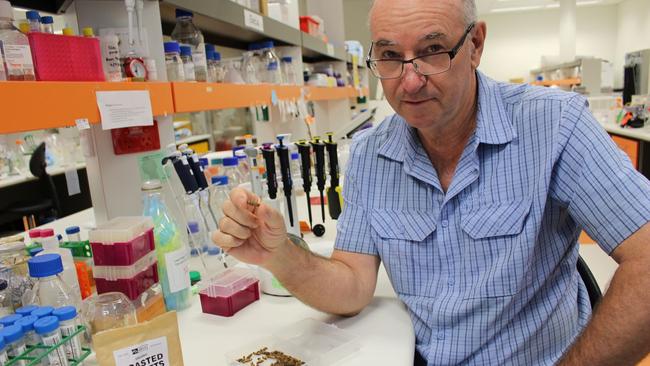James Cook Uni researcher test for allergens in insect foods
Growing human consumption of insects could create new allergies but James Cook University researchers are working to find solutions.

Insects are gaining in popularity as a source of protein for humans but researchers at James Cook University believe more needs to be done to ensure that more allergens are not unwittingly introduced to human diets.
Andreas Lopata, head of the Molecular Allergy Research Laboratory at JCU, said that protein from insects was health and nutritious and products such as a protein powder made from crickets was being consumed widely.
“You can also get muesli bars that are fortified with 10 to 20 per cent cricket protein powder, and it’s incorporated in cookies and pasta,” said Professor Lopata, whose laboratory is part of the university’s Australian Institute of Tropical Health and Medicine.
He warned there may be cross-reactivity if insect proteins used for human consumption were similar to the proteins in an allergen such as dust mites.
“One example of cross-reactivity is potentially people with the house dust mite allergy also reacting to allergens found in these insect-based foods,” Professor Lopata said.
He said dust mite allergy was very common. Currently about 30 per cent of the world’s population have it and that number is increasing.
“Initial data from our lab suggests that some of these house dust mite allergens do cross-react to insects, and this could potentially mean that people with a house dust mite allergy who eat a food product containing insect proteins might experience an allergic reaction,” he said.
Another important allergy link found by his team is between the proteins present in crickets and the proteins in shellfish.
However he stressed that the concepts being studied are still in the research phase.
“We want to know how can we measure these allergens (in insect derived foods) and how can we quantify them,” he said.
Professor Lopata’s laboratory is working with the Australian government’s National Measurement Institute to identify allergens in insect foods such as crickets.
The data they are gathering will be used to develop more accurate allergy test kits to help ensure that foods containing allergens are properly labelled.
“The insect-based food industry has been very co-operative,” Professor Lopata said.
He is confident that insect-derived foods have a great future.
“Insects are a very good and nutritious food product. It’s probably part of the alternative food future to feed billions of people as the world’s population grows,” he said.



